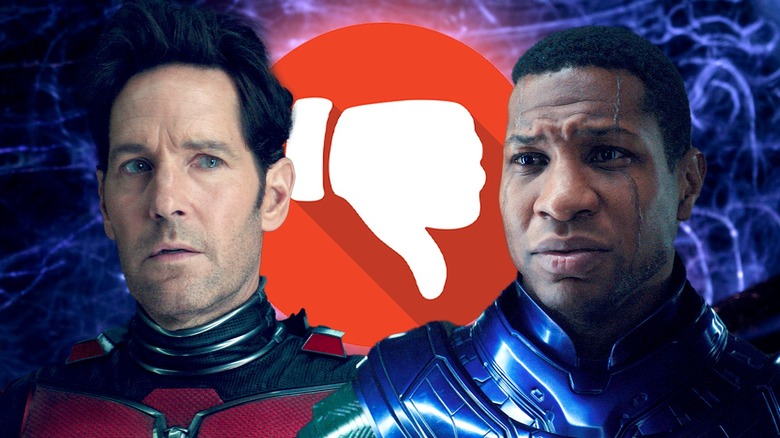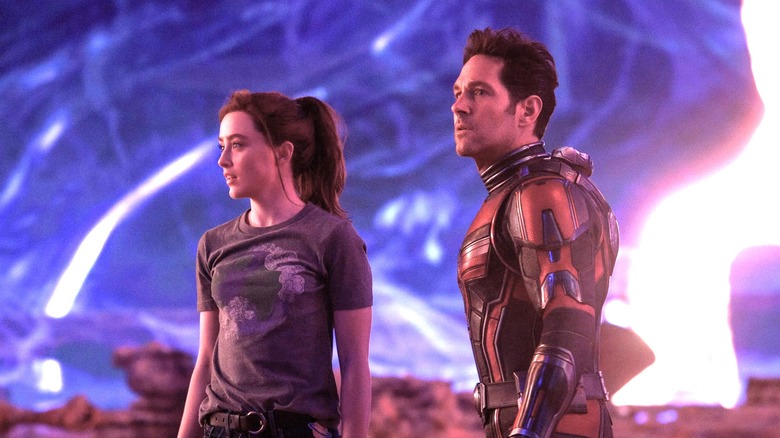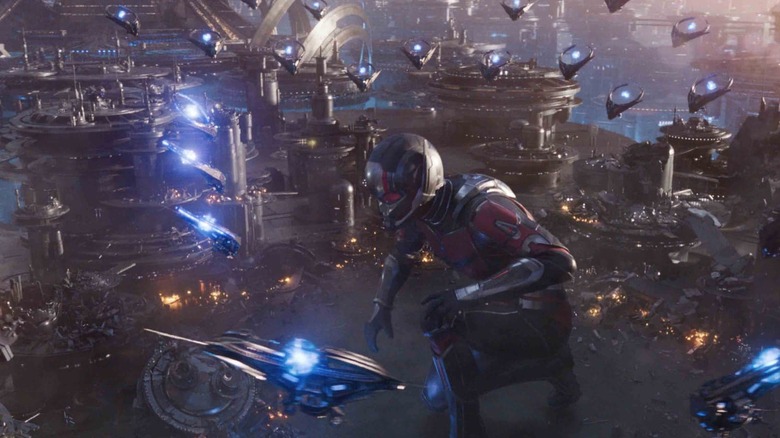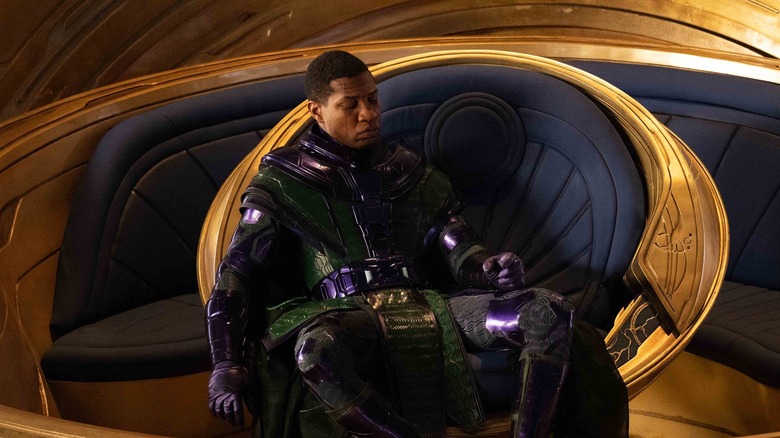Ant-Man 3 Critics Are Right: It's A Very Bad Movie - But It Wasn't Made For Them
Imagine for a moment that you are a professional movie critic working for a prestigious publication where you head up the Arts & Culture desk. You went to film school at Oberlin, then did a masters at Princeton. You were trained on the works of great filmmakers from Andrei Tarkovsky to Orson Welles. Now, you are sitting in a weirdly sticky AMC reclining chair for a preview screening of "Ant-Man and the Wasp: Quantumania." Onscreen, Michael Douglas is standing in a goopy moray of CGI, saying something about technologically advanced socialist ants. Your mind drifts to the ant-themed appetizers being served to press in the lobby, then to the student debt you have yet to pay off. How did you wind up here?
Next to you, a fan is cheering because he saw a creature who he recognized from one of the children's picture books this movie is based on. Is this what people these days think cinema should be? Your parents were right: this isn't any kind of serious career.
In a sense, you, as a film critic, have correctly identified that what you're watching isn't cinema. It features actors, is shot with crews and cameras, and is distributed in theaters, but it is a fundamentally different beast from the rest of the movies on the marquee. From your highly trained and specialized perspective, this is a simple case of a bad movie.
However, to paraphrase a saying often misattributed to Einstein, you can't judge a fish by its ability to climb a tree. The lens of critique de cinéma is the wrong way of looking at this "Ant-Man" movie, or the MCU in general. It must rather be judged by the standards of what it truly is: a comic book on screen.
Marvel movies aren't films, they're comics in motion
The Guardian's Wendy Ide begins her review of "Ant-Man and the Wasp: Quantumania" by stipulating, "It's perhaps not entirely fair to criticise a film in which buildings have tentacles and a supporting character is made of broccoli for lacking logic." She then proceeds to do so anyway. And Ide is not alone. She is among a chorus of critics who heaped scorn on the 31st movie in the MCU, many of whom point to the sheer lunacy of the Quantum Realm where the bulk of the movie takes place as proof of its incoherence.
Other reviews stand out for their insistence that the reviewer understands this whole Marvel thing. At Esquire, Josh Rosenberg makes a point of noting that "Quantumania" draws on "Avengers #8" and "Fantastic Four #76" for parts of its story and setting, defensively establishing his nerd bona fides before criticizing the movie for being too large in scope, too wacky, and having too many funny little creatures. He ultimately pines for the MCU to tone it down a bit, making the claim that superhero movies used to be simple narratives about boy saving girl.
That they did, but that was back when superhero movies were treated as movies first and comic book adaptations second. At this point in the MCU, the pendulum has swung to the other side: these are comic book adaptations first and movies only in the sense that you can see them in theaters. In that framework, nutty concepts and characters being flung at supersonic speed are not only par for the course — they're the whole point. And as the initial box office showed, fans have learned to disregard poor critical reception to the MCU.
Quantumania and the wonderful lunacy of socialist ants
Outside of certain anomalies like Sam Raimi's "Spider-Man" and Christopher Nolan's "Batman" trilogies, comic book movies prior to the MCU ... generally sucked. They shied away from the outlandish elements of the comics to tell a bog-standard hero's journey that deviated from other action movies only in that the main character wore spandex (or leather). But "traumatized guy puts on a suit and punches people" is a premise that works best in a world where the suit is the least unbelievable thing onscreen. The reason so many superhero movies failed, until Samuel L. Jackson gathered Earth's mightiest heroes, is that they swung in the opposite direction.
What Kevin Feige finally proved is that interconnected, longform storytelling has always been the currency on which these characters trade. The underlying wager was that the same formula that kept comic book fans coming back each issue would work to bring them back for each movie.
The MCU also built out its universe in the same way comics do, starting with a handful of characters and introducing spin-off heroes in the margins of those stories. That's how we got to the point where "Quantumania" can give fans M.O.D.O.K., socialist ants, and the Council of Kangs, all in the same movie, without seeming out of step — to a comic book fan, that is.
Six years after the Hulk fought a giant wolf alongside a Norse god and a guy made of rocks on a rainbow bridge in outer space ("Thor: Ragnarok"), traditional critics still don't seem to understand the big picture. They still want to view MCU movies through the lens of traditional cinema, to judge a fish by its ability to swim or an Ant-Man by his ability to carry a three-act structure.
Critics and Kangs in the toothpaste aisle
A popular online debate in recent years frames the MCU in opposition to so-called "real cinema." There are certainly important issues bound up in that paradigm which merit addressing, especially the lack of funding available to independent or auteur movies in this era of franchises. Certainly, the risk-averse mindset of Hollywood is detrimental to the free expression of art. But the people most invested in the "MCU vs. real cinema" debate seem to be those with a distaste for MCU movies on a purely aesthetic or intellectual level, i.e., those who consider them to be bad movies.
The issue is one of framing and category. "Quantumania" may be screening next door to a remaster of "Casablanca" at your local theater, but toothbrushes are right next to condoms at your local Target and only one of those will clean your teeth. What must be reframed is the idea that MCU movies are competing in the same arena as the latest Palm D'Or winner.
Bad movies do exist in the MCU. Even the most ardent Marvel fans won't defend "Thor: The Dark World." But bad MCU movies are bad on a different rubric than other movies. Comics have a particular set of sensibilities, their own structural forms, and a unique approach to storytelling. You would not expect a single comic book issue to be a self-contained story, but films are traditionally expected to do just that.
Just because the medium is now film instead of paper does not magically change that formula. To watch giant socialist ants fight a time-traveling space warlord and call it a bad movie is akin to seeing a giraffe and calling it a bad horse. "Quantumania" is indeed bad cinema, but it is an excellent MCU entry.



